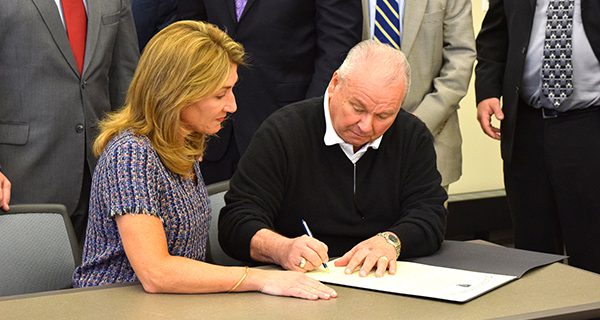[ccfic caption-text format="plaintext"]
By Douglas McCulloch
Hometown Weekly Staff
The Town of Walpole officially signed a Community Compact with the Commonwealth of Massachusetts last Wednesday.
The signing ceremony was attended by a number of local and state political figures. Leading the signing was Lt. Governor Karyn Polito, along with state representatives and senators, members of the Board of Selectmen and Town Administrator Jim Johnson.
“With 180 Community Compacts being signed today, its clear we needed this program that reaches all cities and towns in the Commonwealth,” Polito said during the Community Compact signing.
The Community Compact program began under Governor Charlie Baker’s administration. The program is designed to help better connect cities and towns with the state to help cities and towns complete major projects.
Each Community Compact requires a city or town to pick an area of best practices to implement. For Walpole, the town picked the capital planning best practice to implement.
According to the Community Compact FAQ, the capital planning best practice is designed to help cities and towns better prepare for major capital projects.
The FAQ noted that “[f]unding capital needs on a regular basis is critical to maintaining publicly-owned assets and delivering services effectively. The community develops and documents a multi-year capital plan that reflects a community’s needs, is reviewed annually and fits within a financing plan that reflects the community’s ability to pay.”
The capital planning best practice will be implemented mainly through potential capital projects involving Walpole schools.
In March, the Walpole School Committee authorized the superintendent to submit a statement of interest to the Massachusetts School Building Authority expressing the district’s examination of deficiencies in the existing Walpole High School, and outlined a potential project to build a new high school on the grounds of the Bird Middle School.
Polito noted that the Community Compact provides a number of benefits to cities and towns, including assistance from the state to implement the chosen best practice, assistance and better access to state grants, such as the MassWorks grant program, and more.

























